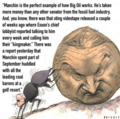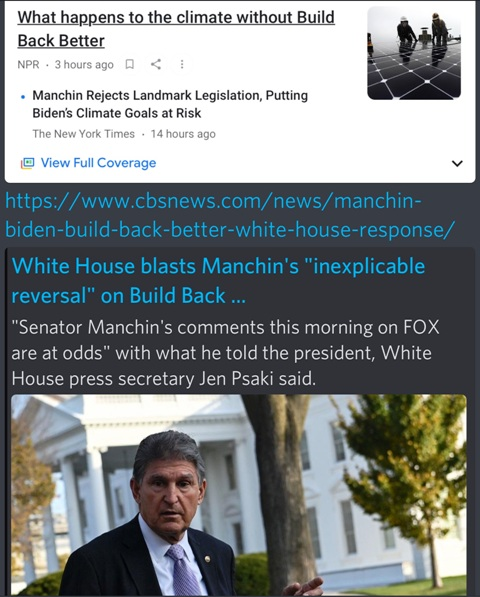File:McKibben re Manchin - Dec 2021.png: Difference between revisions
Siterunner (talk | contribs) No edit summary |
Siterunner (talk | contribs) No edit summary |
||
| Line 43: | Line 43: | ||
<small>Bill McKibben is a founder of the grassroots climate campaign [http://www.350.org '''350.org'''] and a contributing writer to The New Yorker. He writes The Climate Crisis, The New Yorker’s newsletter on the environment.</small> | <small>Bill McKibben is a founder of the grassroots climate campaign [http://www.350.org '''350.org'''] and a contributing writer to The New Yorker. He writes The Climate Crisis, The New Yorker’s newsletter on the environment.</small> | ||
○ | ○ | ||
:[[File:Manchin, one Senator, acts to kill BBB and US climate plan - Dec 19 2021.png]] | |||
Revision as of 22:42, 21 December 2021
A Note from GreenPolicy360:
As the vitally important climate provisions in the Build Back Better act are now in grave danger, we would ask readers to read the following from our old friend (and political advisor back in the day). Bill McKibben's thoughts on the impact of West Virginia Senator Manchin are worth considering.
And a reminder that Money in Politics, PoliticoPay, is the name of the game in Washington D.C. ... The government is awash with influence-buying dollars, millions of dollars, hundreds of millions adding up to billions every election cycle.
··································
Joe Manchin Has Wrecked the Biden Presidency —- Perhaps He’ll Also Liberate It
The need to appease the West Virginia senator is gone now, and not just on the climate
By Bill McKibben
December 20, 2021
Manchin didn’t just derail Joe Biden’s legislative agenda; he also kept the President from using another suite of powers that belong to the executive alone.
“I’ve tried everything humanly possible. I can’t get there,” Joe Manchin said. “This is a no on this legislation. I have tried everything I know to do.” And with that pathetic brushoff—he sounded like a feckless TV bachelor explaining why he couldn’t hand his rose to a hopeful contestant—the West Virginia senator put the kibosh on the Build Back Better bill, and with it pretty much all the legislative priorities of the White House.
There will be endless analyses of this breakup because it’s so devastating: what Manchin really did was kill momentum for a different kind of country, which began to build with Bernie Sanders’s 2016 run for the Presidency. That campaign and its 2020 successors (including Elizabeth Warren’s Presidential bid) uncovered a deep progressive streak in what was supposed to be a center-right country; Biden got the Presidency but Bernie got the bill, a serious return to the days of L.B.J. and the idea that big government can solve problems.
The polling data make clear that most of the measures in the bill have the support of most of the people in the country—but we’re past the point where anyone takes actual majorities of Americans seriously. The more critical data points: Manchin received more money from the fossil-fuel industry during the past election cycle than did anyone else in the Senate, and the Koch network came out hard against the bill, as did the U.S. Chamber of Commerce. All those Fortune 500 companies that are forever insisting how much they care about diversity and sustainability banded together to pressure Manchin, because they care far more about the corporate tax rate.
Against this backdrop, Biden’s hard-earned mastery of legislative bargaining was to be the equalizer. But what was he supposed to do other than what he did: give in to Manchin over and over, in the hope that he would soften? Manchin stripped the bill of the climate plan that was at its heart, leaving behind only a series of tax credits for renewable energy. When he demanded that the President pass and sign the industry-friendly infrastructure bill before the B.B.B., Biden persuaded House progressives to go along, although it was clear the President had received no guarantees. It’s been a dismal, degrading process, and you had to be a pie-in-the-sky optimist (which may describe Biden) not to fear that this would be the eventual outcome.
But Manchin didn’t just derail the President’s legislative agenda; he also kept Biden from using another suite of powers that belong to the executive alone. Think about climate change: the Biden Administration, which ran on a promise to stop new leases for oil and gas on public lands, just last month approved the largest offshore lease deal in history. The Administration claimed publicly that a court decision had forced its hand, but an earlier memo indicates that officials didn’t really believe that. More likely, they feared upsetting Manchin. Similarly, the Administration has refused to review the Line 3 tar-sands pipeline across Minnesota, even though it’s the same size and carries the same crude as the Keystone XL pipeline, which the Obama-Biden Administration blocked, way back in 2015, on the ground that it would damage the climate. The climate crisis has not, to put it mildly, improved since 2015; the only logical explanation for not blocking Line 3 is a need to appease Joe Manchin, who has taken to calling for a revival of Keystone.
That need to appease is gone now, and not just on the climate. If you’re the President, there’s no need to prove to Manchin that you’re going to be “tough on spending,” so why not call off your plan to start collecting student debts again? Why not use every power still at your disposal to do what you can for the country while you’ve got some power? Acting boldly carries risks. With the Senate split fifty-fifty, if you give Manchin reason to switch parties you lose your ability to appoint more judges, for instance; the power that comes with even a tenuous majority is very real. But using executive authority—and boldly—may be the only way that Biden will get anything done, as long as Manchin (and, perhaps, Kyrsten Sinema) block effective legislative action, alongside a solid phalanx of fifty Republicans. Points to Biden for trying, but, at some point, even in Washington, no really does mean no, and you need to move on as best you can.
Bill McKibben is a founder of the grassroots climate campaign 350.org and a contributing writer to The New Yorker. He writes The Climate Crisis, The New Yorker’s newsletter on the environment.
○
File history
Click on a date/time to view the file as it appeared at that time.
| Date/Time | Thumbnail | Dimensions | User | Comment | |
|---|---|---|---|---|---|
| current | 22:31, 21 December 2021 |  | 370 × 368 (261 KB) | Siterunner (talk | contribs) |
You cannot overwrite this file.
File usage
The following page uses this file:
- Air Quality
- Air Pollution
- Agriculture
- Alternative Agriculture
- Antarctica
- Anthropocene
- Arctic
- Atmospheric Science
- California
- Citizen Science
- City Governments
- Climate Change
- Climate Migration
- Climate Policy
- Countries
- County Governments
- Democracy
- Desertification
- Digital Citizen
- Earth Imaging
- Earth Observations
- Earth360
- Earth Science
- Earth Science from Space
- Earth System Science
- Ecology Studies
- Eco-nomics
- Economic Justice
- Education
- Energy
- Environmental Laws
- Environmental Protection
- Environmental Security
- Environmental Security, National Security
- ESA
- European Union
- Externalities
- Extinction
- Florida
- Food
- Forests
- Fossil Fuels
- Greenland
- Global Security
- Global Warming
- Green Networking
- Green Best Practices
- Green Graphics
- Green Politics
- Health
- INDC
- Maps
- Media
- Money in Politics
- NASA
- NOAA
- Natural Resources
- Networking
- New Definitions of National Security
- New Economy
- New Space
- Oceans
- Ocean Science
- Online Education
- Planet Citizen
- Planet Citizens
- Planet Citizens, Planet Scientists
- Rainforest
- Renewable Energy
- Resilience
- Sea-level Rise
- Sea-Level Rise & Mitigation
- Seventh Generation Sustainability
- Social Justice
- Soil
- Solar Energy
- Strategic Demands
- Sustainability Policies
- Threat Multiplier
- Transportation
- United Nations
- US
- US Environmental Protection Agency
- Water Quality
- Whole Earth
- Wind Energy
- World Bank
- World Wide Web
- Youth
